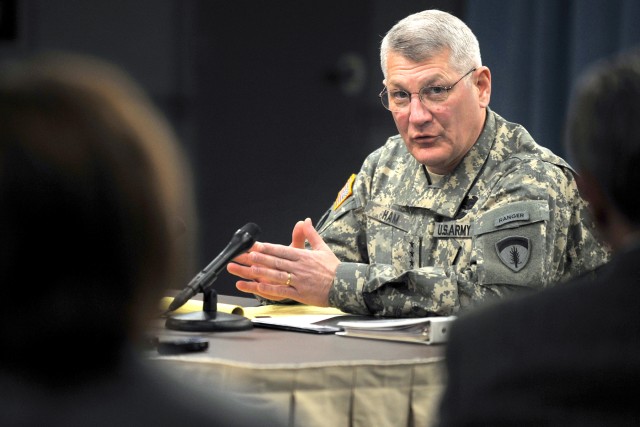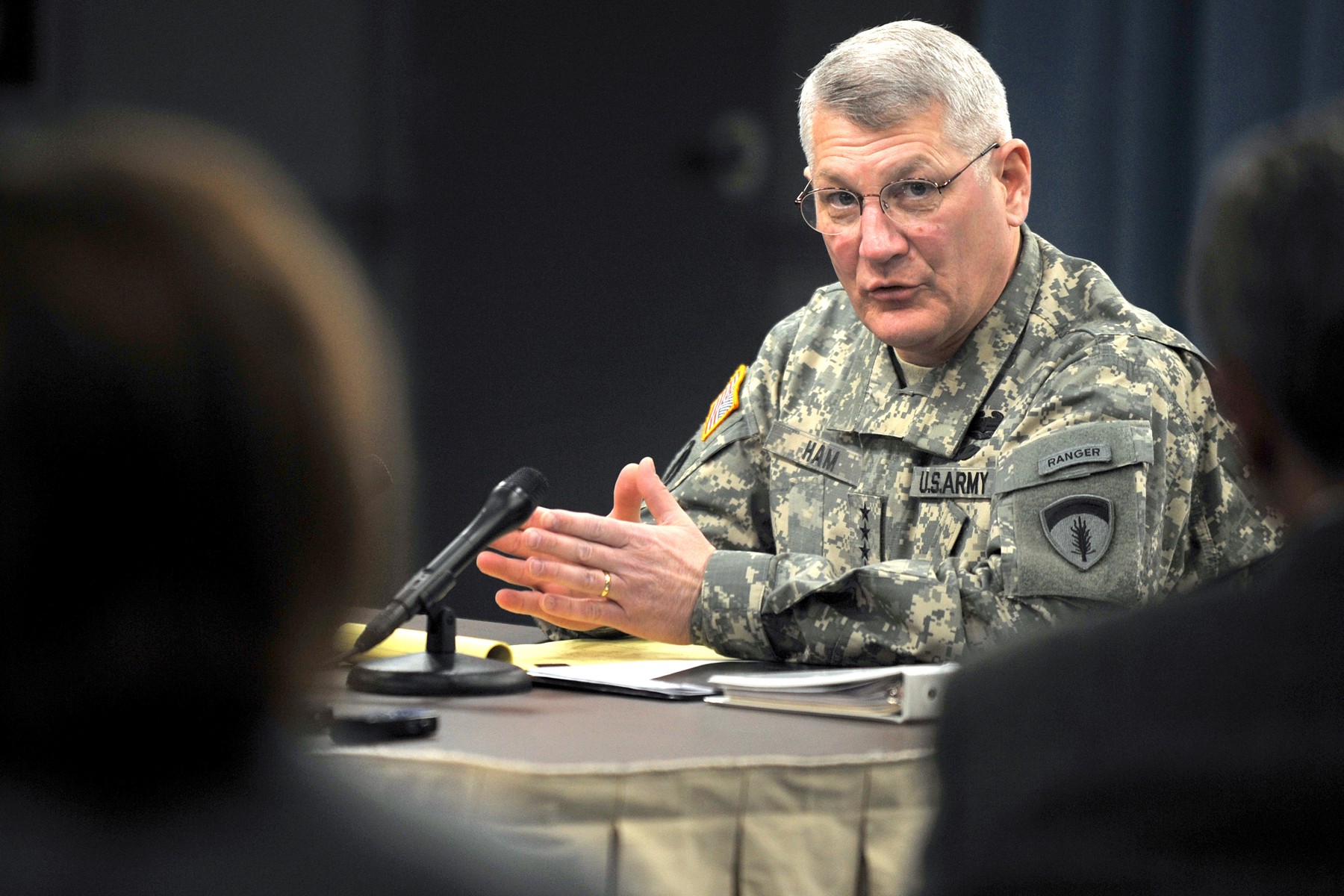
WASHINGTON (Army News Service, Feb. 18, 2009) -- The scheduled loss of two heavy brigades from U.S. Army European Command could hinder the command's ability to continue building partnerships on the continent.
Gen. Carter F. Ham, commanding general, U.S. Army Europe and Seventh Army, told reporters during a briefing Tuesday at the Pentagon that losing those two brigades would impact USAREUR capabilities.
"I have recommended to my operational boss (Gen. Bantz J. Craddock, U.S. European Command) that we revisit those decisions and it is my estimation that in order to accomplish the mission we have that we need a different force posture in Europe than is currently proposed," Ham said.
The Army in Europe is now about 42,000 men and women. By 2013 or 2014, Ham said, the plan is to reduce to about 32,000. That Army, he said, would be based on two brigade combat teams: one Stryker and one airborne. Two heavy brigade combat teams are scheduled to leave Europe in 2012-2013.
Right now, Ham said, no decision has been made to reverse the move of those two units out of Europe. So for now, Ham said, he is preparing for their loss. But he has emphasized that the longer the Army goes toward moving those forces out of Europe, the harder it will be and the more costly it will be to keep them were the decision to be reversed.
"The challenge is the longer we go, of course, if the decision is changed, then it's more difficult -- probably more costly to change the decision," Ham said. "So a sooner decision would obviously be beneficial."
The loss of the two brigades, including the 2nd Brigade, 1st Infantry Division in Schweinfurt, Germany, and the 2nd Brigade, 1st Armored Division, based in Baumholder, coupled with demand for forces in Iraq and Afghanistan staying at current levels, will hinder USAREUR's ability to build partnerships in Europe, Ham said.
"I think if we stay on the current time line and the pace of deployments, operational deployments, does not diminish, then we'll continue to have -- I will continue to have an inability to support the Building Partner Capacity missions to the degree that I think is necessary," Ham said. "So that would be the first and foremost mission that would -- that would be affected by that."
Building "partnership capacity" between the United States and European nations through combined military exercises has been a key focus for USAREUR, the general said.
"That's a real and vital mission for us," Ham said, noting the changes that have happened on the continent since his departure nearly a decade ago. "Just about everything we do has a multinational flavor to it."
The Army in Europe conducts combined training with the armies of other nations, including Bulgaria and Romania. This summer, he said, the command has major multinational training planned.
"It is larger in scale than it has been in previous years and we think that is an important consideration," he said. "If our current plans hold, we'll cycle a number of U.S. companies through both Romania and Bulgaria under battalion-level leadership to partner with the Bulgarians and the Romanians for the training that will occur roughly from July through October. So a larger presence and for a longer period of time -- we think that's a good thing."
He also said USAREUR is in dialogues with those two nations about what other countries would be good candidates to include in training, to immediately participate in observer status, and later with actual troop participation. He said training in Bulgaria and Romania allows the Army to do more than in Germany, due to spectrum management there and to the size of training areas.
Should the need for an increase of forces in Afghanistan arise, Ham said, USAREUR would be postured to provide forces as needed.
"We all are aware of the request by (Gen. David D. McKiernan, commander, International Security Assistance Force and commander, U.S. Forces Afghanistan) for additional forces for Afghanistan," Ham said. " We're also aware that that's under consideration here. And at some point those decisions will be made as to whether additional forces and how many and what type will -- and what timelines would deploy."
Most Europe-based Army forces are now deploying to Iraq, Ham said. A change in where forces would go would necessitate a change in training in Europe. Most tactical training for Army units in Europe is done at the training center at Hohenfels, Ham said. It is there that changes would need to be made to support increased deployments to Afghanistan.
"It's simply changing signage from Arabic to Pashtu or to Dari; a little bit of changing in the clothing that the role-players wear, those kinds of things," Ham said. "More problematic for us is the language capability. We've found that the geography -- the topography is less important than having the right role-players in -- with the right backgrounds so that the unit that's going through its training can exercise all of its intelligence systems, all of its collection systems with the appropriate language being spoken and with the appropriate familial and tribal connections."
The kind of restructuring needed to support that training is "well underway," the general said.
The general also talked about the Army's plans to modify the service's footprint in Europe to five central locations. Accomplishing that involves the return of the 1st Armored Division Headquarters and two heavy brigade combat teams to the United States in addition to the deactivation of V Corps in July.
"That would leave us with five enduring communities in Europe," Ham said. "The biggest challenge in all of that at present is the consolidation of the Airborne Brigade Combat Team in Italy. Construction of that facility is -- I should say the demolition of the site in preparation for construction is now under way. The Italian government's been hugely supportive of that."
The rising suicide rate in the Army is also of concern to Ham. He said one of the challenges he has is ensuring that new commanders assigned to units rotated back from Iraq temper training schedules for their units until Soldiers have had time to settle back in. In that way, he said, he hopes to get a handle on one of the causes of suicide in the Army -- the high operations tempo.
"They have to allow their unit to catch their breath," he said. "Even if the Soldiers are new to the unit, they likely have previous deployments. And so we've got to get some time. So programs that focus on families, focus on soldier well-being; you've seen some discussion about Battlemind and Warrior Adventure Quest and those kinds of things. Most of that, if we can get time, gives us a better opportunity."
An increase in dwell time for Soldiers to about 24 months is on the horizon, Ham said.
"If you assume that current force demand, then much of it then revolves around how rapidly can you grow the Army," Ham said. The Army plans to increase its end strength by some 74,200 Soldiers across the total force. Tied up in that effort, Ham said, is funding, construction, retention and recruiting. "So I think probably -- we're probably at least a couple years away from getting to 24 months dwell."
Were force demand to stay the same in Iraq and to increase in Afghanistan, Ham said, current dwell time of 12 months may not decrease -- but, he said, he believes the goal is to keep the demand where it is now and, as the Army grows, Soldiers can have additional dwell time.
"That dwell time not only helps us in the human dimension, it also helps us get back into this balance of full-spectrum capabilities that we have," Ham said. "(So) that we don't have to keep training units exclusively for counterinsurgency operations and we can start getting some more training in and provide the capability to the nation that we are supposed to."

Social Sharing